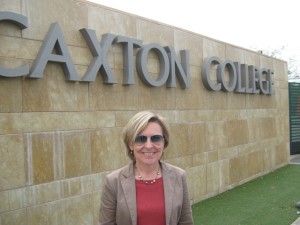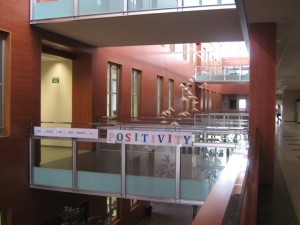Since what Shakespeare called the ‘happy few’ started an educational adventure in 1987, Caxton College has become an educational icon of internationalism in the Valencian Community, and in Spain.
When you drive into Valencia from the north, it’s not easy not to notice Caxton College; what you can’t see from the motorway however is the labour of love that has gone into its making from sisters Marta and Amparo Gil since they founded the school in 1987.
The school’s motto is “Live Honestly”, which is a reference to a Roman philosopher on the principles of law and justice and is connected to the fact that another of the Gil sisters is in fact a judge.
They chose the name because they were looking for an English name from history associated with education, and William Caxton of course introduced the art of printing in England.
His press was famous for editions of Chaucer’s ‘The Canterbury Tales’ and Shakespeare’s ‘Troilus and Cressida’. Caxton’s books were renowned for their craftsmanship and careful editing and so Marta and Amparo decided upon this name.
Although 80% of the students are Spanish, the remaining 20% cover a wide range of nationalities, including Russian, German, Bulgarian, Japanese, and of course British and American; particularly since the installation of the NATO and UN bases in Valencia. There are now over 1,300 students at the school, which started out with the ‘happy few’ of 40, and the large-scale and very costly building programme, which led to the opening of a completely new secondary centre and, sports facilities including an indoor swimming pool, was not intended to increase numbers, which have not varied much in ten years, but to increase the quality and range of facilities.
There is also a spacious new administration area, so large in fact that I was about to suggest building a cricket pitch there, until I realised that had of course been designed to accommodate so many parents.
Amparo learnt her English through a series of summer courses in Ireland and the UK, although she in fact trained as a history and geography teacher. As she told me “one of my favourite games as a child was playing the role of school teacher and this influenced my decision later to become a teacher”.
Her decision to set up a ‘British’ school can perhaps be attributed to her attitude towards Britain: “I am a great admirer of Great Britain and the British people, for many reasons, but mainly for the way that they maintain their heritage and for their solidarity. I have always admired their work ethic, their perfectionism and meticulousness and I have learned a great deal from working alongside them.”
New technology is given great importance at Caxton, and it is clear that, while not forgetting traditional values, the school’s income has clearly been reinvested in the school’s facilities, including the initiation of an ambitious programme to work with individual student ipads.
Amparo had a very happy childhood; she was the eldest of 5 sisters and was heavily influenced by a grandfather, who used to sell oranges, and who insisted on the importance of his grand-daughters learning English; as well as a grandmother who was the centre of the family, and who combined tradition with education and had a shrewd outlook on life. As an avid reader she always knew exactly what was going on in the world.
 As for her parents: “they were always supportive and encouraged me to be independent. They challenged me to do what I wanted and trusted in my judgement.”
As for her parents: “they were always supportive and encouraged me to be independent. They challenged me to do what I wanted and trusted in my judgement.”
Her sense of family persists today and she adds that “first and foremost I am a family person”. Her own children have now ‘flown the nest’ and, like so many Caxton Kids are pursuing their projects all over the world. After spells in Austria and Hong Kong, her eldest son is now pursuing a career in hotel management in California, her daughter will soon be off to New Zealand to get some teaching experience, and her youngest is studying engineering in Southampton.
In fact Caxton is almost a microcosm of the global village, and their Old Caxtonian Association is a roll call of almost a thousand successful young people from twelve generations of Caxton graduates.
Amparo is always moved when an old student contacts her to tell her how much they miss the school, and one who no longer misses it was introduced to me. Daniel Sáez is the school physiotherapist, but he was also at one time the first qualified physiotherapist to work in Belorussia, where he looked after the Bate Borisov professional football team.
Amparo is an inquisitive, passionate person, continually striving to learn new things, and especially interested in psychology, management, emotional intelligence and human resources. And now that her own children have ‘liberated’ her, she spends much more time learning new things and ensuring that her staff of 120 teachers is constantly offered opportunities to learn new skills and to keep up to date with all the advances in educational methodology.
She is also acutely aware of her responsibility; as she admits: “I am committed to the welfare and education of the more than 1,300 students that attend our school. I keep up at all times with the new UK learning initiatives to make sure that Caxton College represents the highest standard of British education in Valencia”.
Personal contact is one of the keys to her philosophy, and Amparo is no absentee entrepreneur, but somebody who knows everybody who works for her, participating personally in the selection process for new teachers, where she is constantly on the lookout for teachers who can work as part of a team, enjoy rising to challenges and are concerned with the development of the whole child, and not just in ‘teaching their subject’.
But the British system and the English language are not her only concerns; the school recently went through the exhaustive procedure necessary to become an official Instituto Cervantes centre for teaching Spanish, where foreign students and parents can get their Spanish language skills up to the required level.
With her sights trained firmly on achievement, it is comforting to know that success is balanced with solidarity. Many of the students do voluntary work as part of the school’s commitment to the Duke of Edinburgh Award scheme, and the school is constantly raising money with events such as the recent performance of Mama Mia and collaboration with NGOs such as Fundacion Emalaikat, which runs a series of development programmes in Ethiopia and Kenya.
 As well as their full time day and boarding students, Caxton also runs Saturday morning and summer courses, combining English and Spanish language courses with sports.
As well as their full time day and boarding students, Caxton also runs Saturday morning and summer courses, combining English and Spanish language courses with sports.
Valencia has always been an international city, and with first class schools like Caxton, professional people from all over the world can feel confident about settling here, for good or for a short time, while their children’s education continues uninterrupted, at a high level without pause or hiccup.

